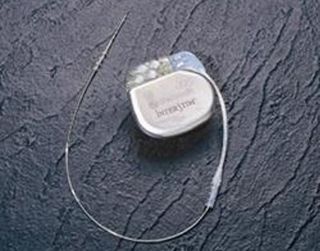Pacemaker Device Can Cure Bowel Control Problems

A pacemaker-like device may help those who suffer from bowel incontinence, or loss of bowel control, researchers say.
The first person in the United States to receive the device since its approval as a treatment for bowel incontinence has seen her symptoms improve, said the doctors treating her. The operation took place on June 14 at the University of Rochester Medical Center.
For some patients, the device cures their incontinence, allowing them to regain full bowel control. Several studies conducted prior to the Food and Drug Administration's approval showed that between 40 and 50 percent of patients who received it regained full control. The FDA approved the device to treat bowel incontinence in April.
The implant is an alternative for those who aren't helped by existing treatments, which focus on changing one's diet and taking medication, said Dr. Jenny Speranza, an associate professor of colorectal surgery at the center, who performed the surgery to implant the device.
"Loss of bowel control can be devastating, in many cases significantly disrupting daily life," Speranza said. "I have a lot of [patients] who won't even leave their house," or hide the condition from their friends, family and doctor, Speranza told MyHealthNewsDailiy. "They're humiliated, they're embarrassed," she said. [See Top 10 Stigmatized Health Disorders].
"We're excited to be at the forefront in treating this disorder, offering a new option for so many men and women who are suffering in silence," Speranza said.
Bowel incontinence
Sign up for the Live Science daily newsletter now
Get the world’s most fascinating discoveries delivered straight to your inbox.
As many as 18 million Americans may suffer from bowel incontinence. Severity can range from occasional leakage of stool to complete loss of control over bowel movements, according to the National Institutes of Health.
The condition can be caused by damage to the nerves or muscles due to trauma, surgery, a tumor, radiation treatments or childbirth. More than 50 percent of individuals in nursing homes and institutions suffer from some degree of bowel incontinence, Speranza said. And women who deliver a baby vaginally have a 25 to 30 percent chance of damaging their sphincter muscles, and may only develop symptoms of bowel incontinence years later, Speranza said.
The device, about the size of a stopwatch, constantly emits electrical pulses to stimulate the nerves that control the bowel or bladder. These pulses help to strengthen muscles that regulate bowel functions, including the sphincter muscles. The device has been available for more than 10 years to treat urinary incontinence.
It's too early to tell how many patients will benefit from the device, which is called InterStim Therapy and is manufactured by Medtronic, said Dr. Laurence Sands, professor and chief of colorectal surgery at the University of Miami Miller School of Medicine, who was not involved in treating the Rochester patient.
But the device is not for everyone, Sands said. It will probably be most beneficial to those whose incontinence is due to a neurological problem, rather than damaged muscle, which can be repaired by surgery, he said.
Barriers to treatment
Although the treatment is now FDA approved, patients must get authorization from their insurance carrier to receive the device, Speranza said.
Some major insurance carriers haven't recognized the device as a treatment for bowel incontinence, although it is frequently used for urinary incontinence, Speranza said. She attributes insurance companies' lag to approve this device for bowel incontinence to a reluctance of society as a whole to address this condition.
"It’s a stigma, not only to the patient, who feels shame and embarrassment, but also to society, as people just don't want to deal with such an unpleasant topic," Speranza said.
Pass it on: A pacemakerlike device can improve symptoms of bowel incontinence.
This story was provided by MyHealthNewsDaily, sister site to LiveScience. Follow MyHealthNewsDaily staff writer Rachael Rettner on Twitter @RachaelRettner.

Rachael is a Live Science contributor, and was a former channel editor and senior writer for Live Science between 2010 and 2022. She has a master's degree in journalism from New York University's Science, Health and Environmental Reporting Program. She also holds a B.S. in molecular biology and an M.S. in biology from the University of California, San Diego. Her work has appeared in Scienceline, The Washington Post and Scientific American.
Most Popular

